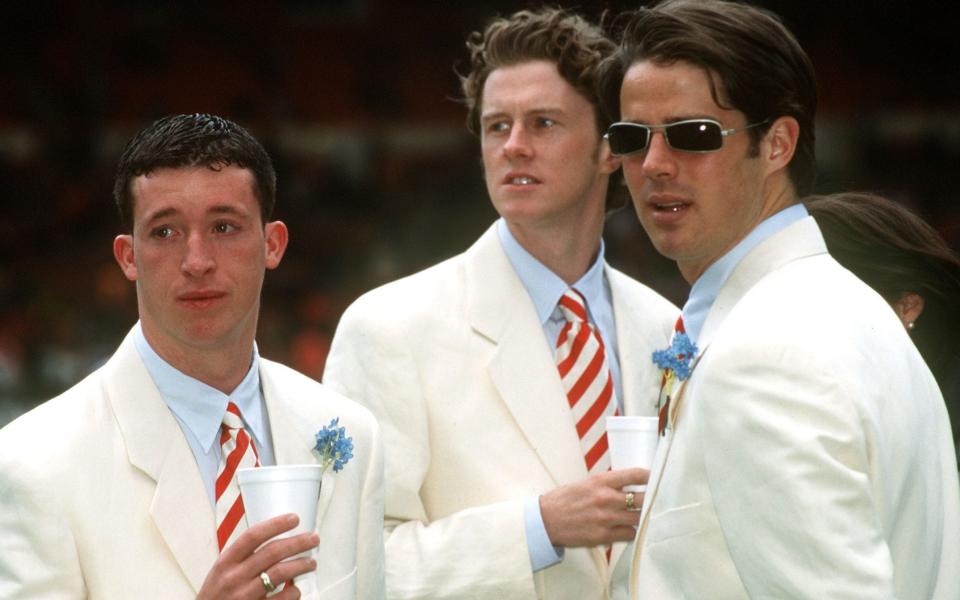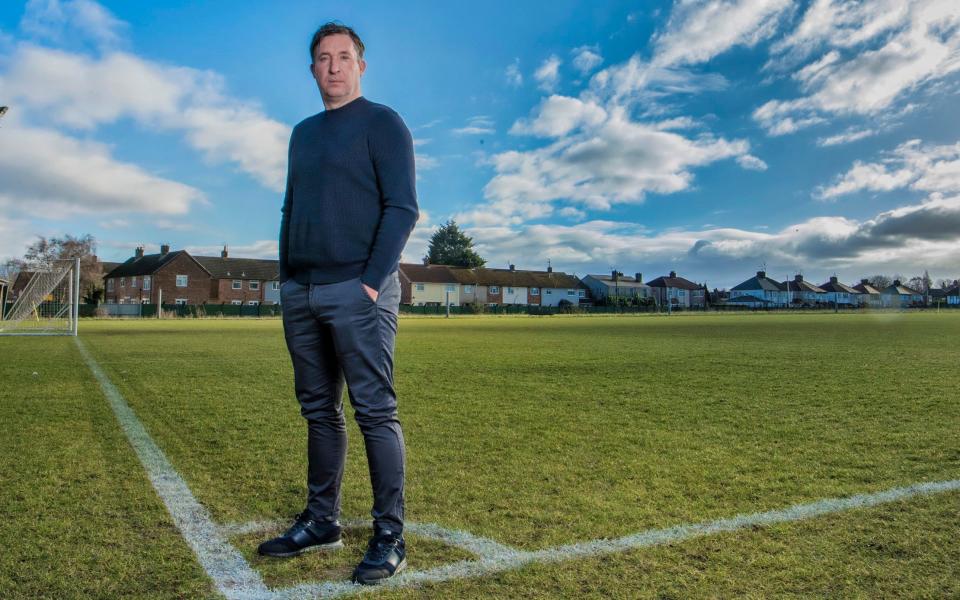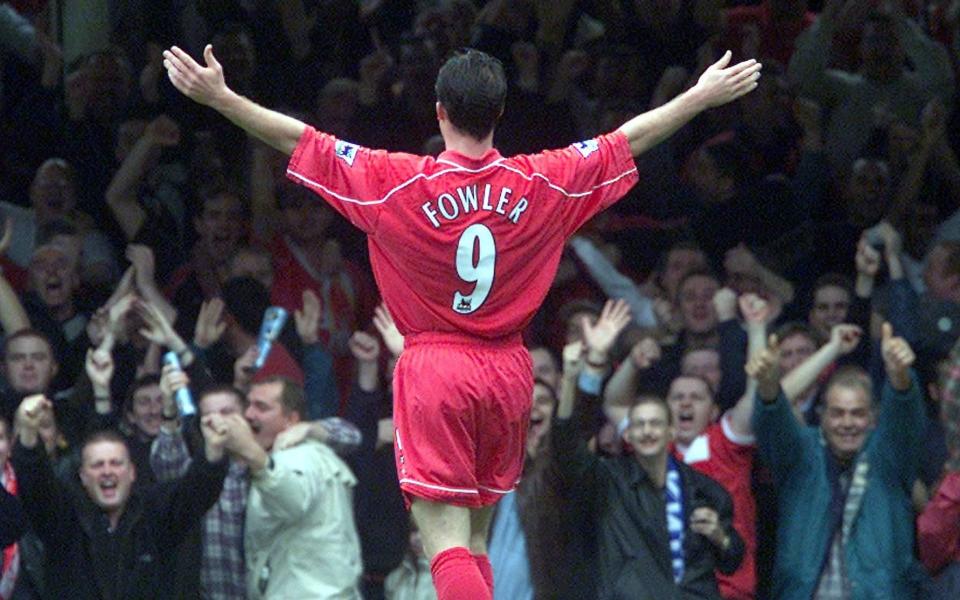Robbie Fowler: The 'Spice Boys' label has held me back

It is Robbie Fowler himself who raises it. And does so right at the start of our interview.
“I liken it to the movie ‘The Life of Brian’,” he says of the iconic Monty Python film from the late 1970s. “They are all stood around the cross talking about names and say ‘Brian’s a good one’. People thought – we will throw that [at us]: the ‘Spice Boys’. And it stuck.".
Ah, ‘Spice Boys’. The pejorative term applied to the Liverpool team of the mid 90s, with Fowler, Jamie Redknapp, Steve McManaman, Jason McAteer and David James at the heart of it, who donned their sunglasses and cream suits for the 1996 FA Cup final but did not win. It was, obviously, a play on the pop group, the Spice Girls.
Fowler hated it. Not least because it was never true. “The Spice Boy thing was a nickname and the fact that we never won anything played a big part in it,” he says. “Stories have grown arms and legs and I have tried to get rid of that.” Yes, he was the “joker” in the dressing room but only to “lighten the mood”. He could not have been a more serious footballer.
“Nobody knows anything about me and that’s something I am quite proud of. No one knows what I am like. People have this perceived idea,” Fowler says. “What I am now is I am probably quite boring. I understood what a dressing room needed years ago but people still have that idea of me as laughing and joking and not to be taken seriously.
“That’s my perception… I wore my heart on my sleeve, I wanted to be better than anyone else and there were times when I got carried away on a football pitch.”

Fowler is 47. He is the holder of the highest coaching badge, the Uefa Pro-Licence. He has taken himself around the world and succeeded in management in Thailand, Australia and India. He is deadly serious about being a manager. And yet he cannot get a job in this country.
Fowler’s frustration is as evident as his desire and determination although it raises the question – given his success as a player, given the wealth he has accrued, partly through shrewd investment, given the hugely impressive and laudable Fowler Education and Football Academy (FEFA) that he set up – why?
“You know why?” Fowler says. “It’s a simple answer and it’s exactly why I got into the game of football. I feel I have so much to give. I love football and it’s the only thing I want to do. Don’t get me wrong, I have been successful in other aspects of my life. But does it make me happy? I am a football man. If you sat in a room full of kids and they say ‘I want to be a footballer’ what do they say when you ask why? What’s the answer? They want to be rich. My answer was because I love football.
“It’s the same with wanting to be a coach or a manager. I want to stay in football. I have done all my badges, I am halfway through an LMA (League Managers Association) diploma and I am forever learning and wanting to better myself and it’s exactly what I was like as a footballer. You practise because you want to get better. It’s the same as a coach. It’s massively important you keep learning.”

We are talking at Melwood, Liverpool’s iconic former training ground which the club left in Dec 2020 and which he took over. It is where FEFA, which offers an intensive football programme with an academic curriculum for 16 to 19-year-olds, is now based. Fowler started it with his brother Scott near where they grew up in Toxteth and is concerned that I might think we are meeting there as a deliberate ploy.
“This isn’t about changing perceptions. This was always in the pipeline,” he says of the academy. “And the fact that I am at Melwood now speaks volumes of having a good relationship with the club, with the foundation. It’s not because I want to show people I am serious. It’s just what I am like. But it’s an example of showing that people don’t really know me.”
For Liverpool fans, Fowler will always be ‘God’. He is a club legend. The former England international was a sensation from the moment he scored on his debut against Fulham, in the League Cup in Sept 1993. In the return game, at Anfield, he scored five. He was 18. Fowler became the fastest Liverpool player in history to 100 goals; he would go on to score 183 goals in 369 games for the club, even though he was hampered by injury. He was a lethal finisher and is rightly revered.
“What was I like as a player?” Fowler rhetorically asks. “I worked harder than anyone else. I hate using this, because it sounds egotistical, but I was always deemed as one of the most ‘naturally gifted’ strikers. Quite frankly it annoys me because of the hours and hours of practice I put in, the monotony of doing the repetition to make it look natural. It’s like second nature. If you are doing something all the time it makes it looks natural but it was only because I did hours and hours of practice.
“I remember as a kid, where I lived there was a grass pitch across the road and I was there every night practising with my right foot. I could not use my right foot and now people say they do not know which foot I favoured. And that’s a huge compliment. It showed those hours worked for me and I have that in me. I know if I have to do things better I will work at it and it’s the same as a manager now.”
And he is deadly serious about being a manager. “No one can throw at me that I’m afraid or will shirk anything,” Fowler says. In 2012 he went straight from being a player to acting head coach – because he was the most experienced – at Muangthong United in Thailand and took them to the equivalent of the FA Cup final.

It gave him a taste for management but he was determined to get his coaching badges and returned to the UK working at Liverpool’s academy and then with clubs such as MK Dons. Fowler “held off” applying for jobs to make sure he was fully qualified.
In 2019 he signed a two-year contract to take over Brisbane Roar with assistant Tony Grant, the former Everton midfielder. They hauled the club into the top four of the A-League, which was some achievement not least because the season before they arrived Brisbane conceded 77 goals. Under Fowler it was just 24 and they were the form team when the coronavirus pandemic struck.
“One of the proudest things for me – and that includes all the goals I scored and trophies I won – is we had the best defensive record,” Fowler says. “A lot of people called it ‘Fowler-Ball’ and I was delighted with that because it showed we had a real identity. We played the right way.
“The pandemic ruined us. It’s hypothetical but I think we would have won it [the league] but sponsors were pulling out and there was no money and I told the club I needed to go home. I think I got the last flight out of Australia.”
‘If the opportunity comes up I would love to take it’
Fowler wanted to return but Brisbane said they could not afford to keep Grant so he quit on a point of principle and then “achieved more” in India where he was appointed manager of Super League club East Bengal in 2020. “I took a team that had just gone into the ISL – it was essentially like the owners of Accrington Stanley going into the Premier League having bought the rights but with the same players – and I had 10 days before the season started,” Fowler says of a club that eventually became stymied in a dispute with its former owner.
“I went to Australia and backed myself and did the same in India and I will do that with anyone. If the opportunity comes up here, and it’s the right one, then of course I would love to take it. Chairmen and prospective owners might ask – why has he only done it abroad? But they are the only ones who have taken a chance,” Fowler explains.
“You can go around and tell everyone how much you love it but you have to earn the stripes. I have done everything right. I have had my learning curve. I have proven to people I am willing to travel and take a chance and the big one is going out of my comfort zone. If you think of the places I have been then from a cultural point of view every single one has been different. In terms of the experience of managing football teams I have covered a lot of ground and ticked a lot of boxes and it’s now waiting for the one. I am confident to keep going and do what I need to do.”
Now he wants a job in the UK. “I am waiting for an opportunity,” Fowler says. “I have been in touch for various people and sometimes you don’t get phone calls back, you don’t get anything back.”
‘I want to be the best – I want to go up the leagues’
How does that feel? “Rude, for a start,” he admits. “You are waiting for phone calls back but nothing. Maybe the fact that I don’t have an agent matters. Maybe I need to get one but I never had one as a player. I had an adviser but it probably goes back to me as a person. I was comfortable doing what I was doing.”
Fowler is hoping this interview might not only change perceptions a little but make some club executives think. “I want to be the best. I want to go up the leagues. But my ego is not so big I wouldn’t go down the leagues. Just have the conversation with me,” he says.
“Look at Mark Hughes and [League Two side] Bradford. That makes sense because they are a club who you look at and see what they have achieved in the past. It’s no different for me.
“I don’t want to put my name forward for every job that comes up as I don’t want to get stereotyped. I have to choose the right opportunity. It’s having the club with the right ambition because I think I have proven what I can do. In fact, I don’t think, I know.”

